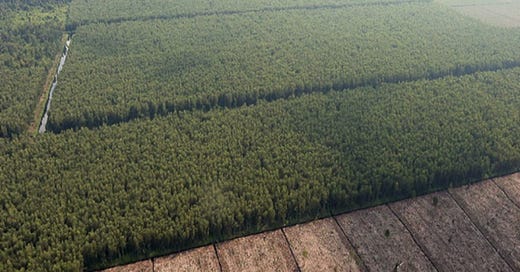This week, the UN Food and Agriculture Organisation is holding the 13th World Forestry Congress, in Buenos Aires. With the slogan “Forests in Development”, the Congress will discuss seven themes, with titles such as “forests and biodiversity”, “producing for development”, “caring for our forests” and “people and forests in harmony”. It all sounds harmless, perhaps even progressive. It is not.
As World Rainforest Movement points out, within these themes are topics that ring alarm bells such as “planted forests”, genetic modification, industrial biofuels and forests and climate change. The WFC promotes the frauds that plantations are forests and that offsets address climate change.
World Rainforest Movement has produced a series of informative pieces outlining the concerns with the World Forestry Congress. The following is a statement from WRM with links to the relevant sections on its website.
This 18 October is the opening day of the World Forestry Congress taking place in Buenos Aires, Argentina.
A number of organizations are carrying out parallel activities to the official congress during the days leading up to it, to voice their concerns around this international meeting. Throughout these days, members of different social movements will meet together to share their experiences of struggle and resistance in communities affected by monoculture tree plantations, and especially to discuss subjects of key importance, such as the food sovereignty of local populations in areas where these plantations are established.
To contribute to this process, WRM has prepared a series of materials related to the World Forestry Congress, which are available through our website. Among the articles that can be accessed there are the following:
“What are our concerns about the WFC?”, which summarizes the aspects of the congress that provoke the greatest concern from a social and environmental viewpoint.
“The carbon neutral fraud at the World Forestry Congress”. The organizers of the congress have declared it a “carbon neutral” event, backing up this claim with the purchase of carbon credits from a Brazilian pulp and paper company that was recently targeted by a civil action filed by the State’s Public Prosecutor’s Office. The article also exposes the fraudulence of the carbon market in general.
“Women’s declaration on the impacts of the expansion of monoculture tree plantations on the grasslands”. Among the arguments used to promote tree plantations is the claim that they bring about benefits for women. In this declaration, however, women from Brazil, Argentina and Uruguay expose and denounce the gender-differentiated negative impacts that they suffer as a result of monoculture tree plantations.
“Argentina: Misiones – pines, pulp mills and lies”. Given that Misiones is described as the country’s “main forestry province”, it will undoubtedly be held up as a “model” for the development of “forestry”, or rather, monoculture tree plantations. This article gathers testimonials from local communities that expose the lies behind this so-called forestry development (in Spanish, available soon in English).
For more information: www.wrm.org.uy






Comments following the original post on REDD-Monitor.org are archived here: https://archive.ph/knPME#selection-757.4-757.14